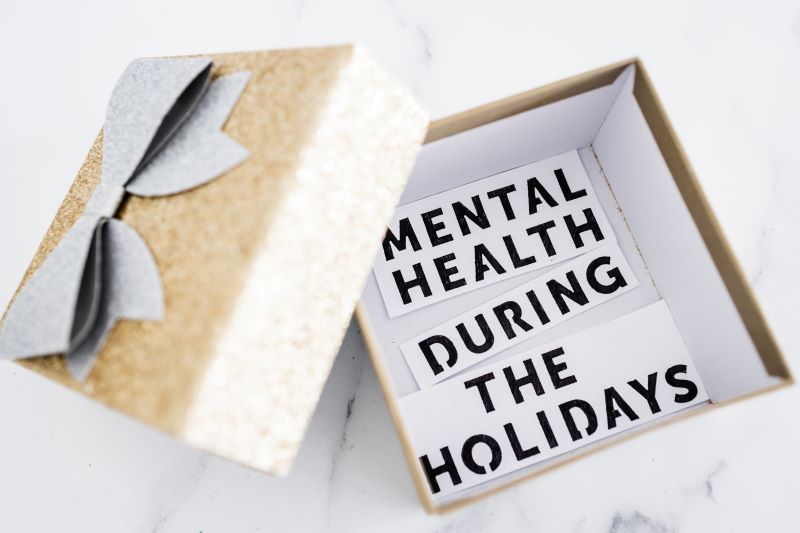The holiday season is a time of joy and celebration with family and friends, but it can also bring about significant stress. From the hustle and bustle of shopping for gifts to the pressure of family and social gatherings, the holidays can take a toll on our mental and physical health.
This blog will help you understand how the holidays can impact your health, and provide you with strategies to handle those challenges.
Why are the Holidays So Stressful?
The holiday season often brings with it a whirlwind of activities, deadlines, and high expectations. This can lead to feeling overwhelmed and anxious. The pressure to create perfect holiday experiences, both in terms of gifts and social gatherings, can be a major source of stress. Additionally, the disruption of daily routines and financial strain further contribute to stress.

Causes of Holiday Stress
There are several factors that can contribute to holiday stress:
- Financial Pressure: The cost of gifts, travel, holiday meals, and events can put a significant burden on finances.
- Time Constraints: Balancing work, social events, and family responsibilities can be exhausting. Taking on too many holiday activities can lead to burnout.
- Family Dynamics: Spending time with family can be stressful for many family members, especially if there are unresolved conflicts or difficult relationships.
- High Expectations: The pressure to create a perfect holiday can be overwhelming and lead to disappointment and stress.

The Impact of Holiday Stress on Mental Health
Holiday stress can take a toll on mental health, exacerbating issues like anxiety and depression. It can also lead to physical symptoms such as headaches, fatigue, and sleep disturbances. Recognizing the impact of holiday stress is the first step toward managing it effectively.
Chronic holiday stress can lead to symptoms such as:
- Anxiety and depression: Increased feelings of worry, sadness, and hopelessness.
- Insomnia: Difficulty falling asleep or staying asleep.
- Irritability: Short temper and difficulty coping with stress.
- Physical symptoms: Headaches, stomachaches, and muscle tension.
Coping with Holiday Stress
Managing holiday stress involves proactive planning and self-care. Here are some effective strategies to cope with the pressures of the season:
Creating a Holiday Stress Management Plan

- Identify Your Personal Stress Triggers: Understanding what specific situations or expectations causes you stress during the holidays can help you address those stressors more effectively. Once you identify your triggers, you can develop strategies to manage them.
- Prioritize What Truly Matters: Focus on what’s most important to you and let go of less significant tasks. This might mean saying no to some events, delegating responsibilities, or cutting back on gift giving.
- Be Flexible in Your Holiday Plan: Allow yourself the flexibility to adjust your plans as needed. This reduces the pressure to stick to a rigid schedule and helps you enjoy the moments as they come. Remember that it is okay to say no to invitations or activities.
- Communicate Openly with Family and Friends: Be honest with your loved ones when you feel the need to limit or change engagement plans to protect yourself from feeling overwhelmed. Be honest if you need to control your holiday spending which might mean spending less on gifts or dinner parties. If hosting a holiday party, plan the menu and desserts with contributions from everyone.
- Be Honest with Friends about Needing Emotional Support or Connection: For many individuals, the holidays bring feelings of sadness and loneliness due to the loss of loved ones or not having social engagements. Let family and friends know that you need time with them in ways that make you feel a sense of joy and belonging.
Additional Tips for Managing Holiday Stress
- Practice self-care: Make time for activities that you enjoy and find relaxing, such as reading, taking a bath, or spending time in nature.
- Continually set and adjust expectations: Don’t try to do everything. Focus on what’s important to you and let go of perfectionism.
- Limit alcohol consumption: Excessive alcohol use can worsen anxiety and depression.
- Seek professional help if needed: If you’re struggling with severe holiday stress, consider talking to a therapist or counselor.

Tips for Helping a Family Member with Mental Illness During the Holidays
Offer Practical Support:
- Help with holiday preparations, such as shopping, cooking, or decorating.
- Assist with daily tasks that might be overwhelming, like cleaning or running errands.
- Offer transportation to appointments or social events.
- Ask how you can best support them.
Be Patient and Understanding:
- Recognize that the holidays can be particularly challenging for someone with mental illness.
- Be patient with their mood swings or changes in behavior.
- Avoid judgment or criticism.
Encourage Self-Care:
- Remind them to prioritize their physical and mental health.
- Suggest activities that promote relaxation, such as yoga, meditation, or spending time in nature.
- Encourage them to maintain healthy routines, including regular sleep, a balanced diet, and exercise.
Communicate Openly:
- Create a safe space for them to express their feelings and concerns.
- Listen actively and empathetically.
- Avoid minimizing their experiences or offering unsolicited advice.
Set Realistic Expectations:
- Help them set realistic goals for the holiday season.
- Encourage them to pace themselves and avoid overcommitting.
- Be flexible and understanding if they need to change their plans.
Seek Professional Help:
- Encourage them to stay connected with their mental health professional.
- Offer to accompany them to appointments or therapy sessions.
- Help them develop a crisis plan in case of emergencies.
Take Care of Yourself:
- Remember that you can’t help someone else if you’re not taking care of yourself.
- Set boundaries and prioritize your own well-being.
- Seek support from friends, family, or a therapist if needed.
By implementing all of these holiday strategies above, you can reduce holiday stress and focus on what truly makes the season special for you. Remember, the holidays are about creating meaningful memories, not achieving perfection. Be kind to yourself. Put your mental health first to make room for joy and relaxation. Be your own best friend. Be forgiving with yourself.
With planning, good communication with family and friends, and professional support if you need it, you can create a peaceful and joyful holiday this year.
At Catawba Valley Healthcare in Hickory and Valdese, North Carolina, we are here for the health care of our surrounding communities. If you need professional support from a primary care physician or a mental health professional, visit our website @ cvhnc.org or call us today at (828) 695-5900.

